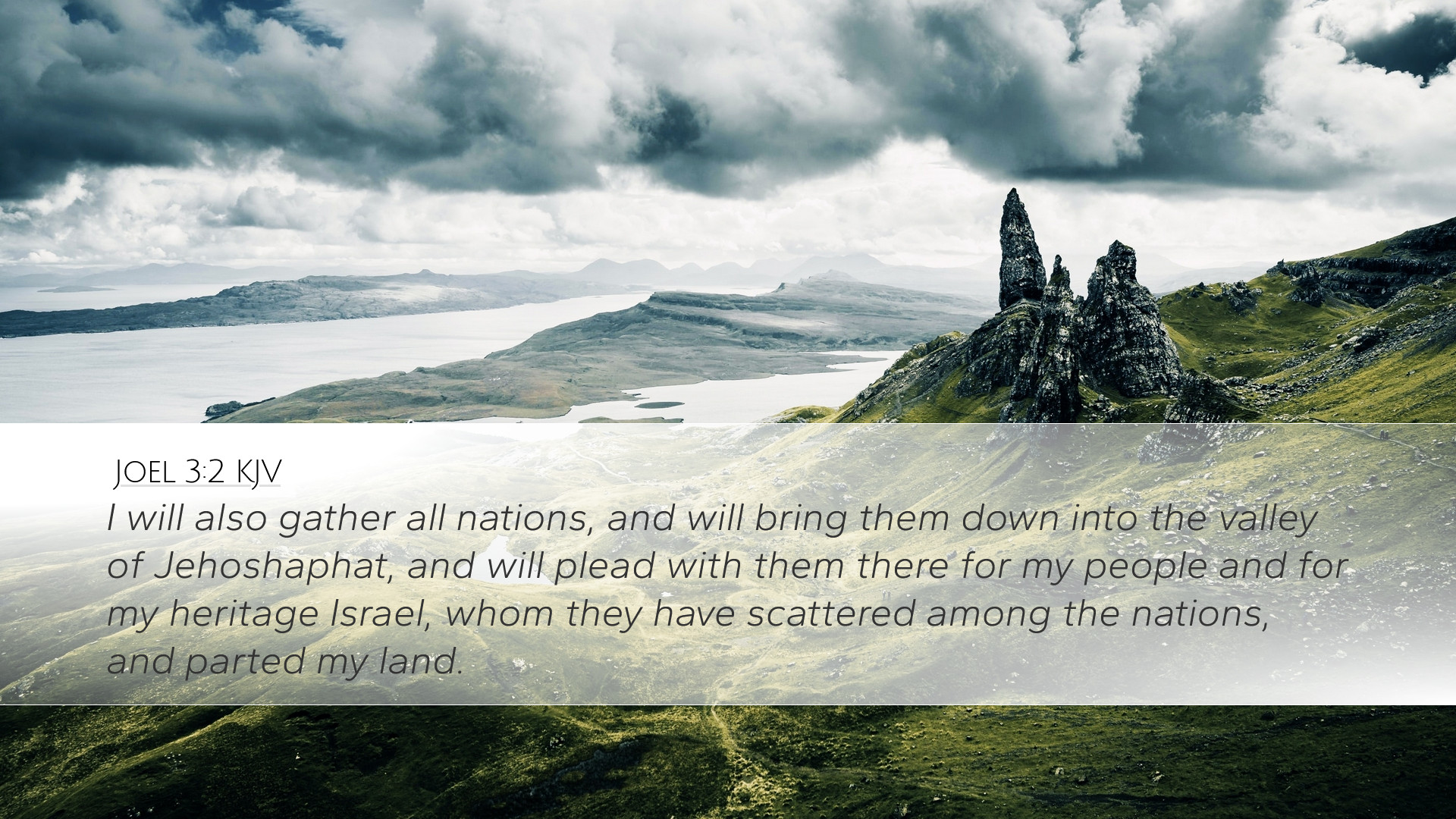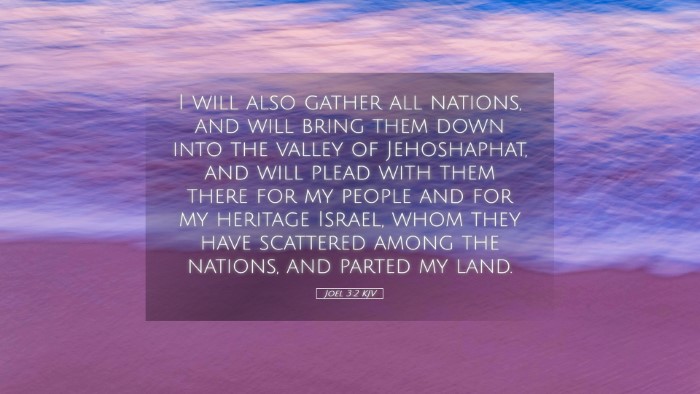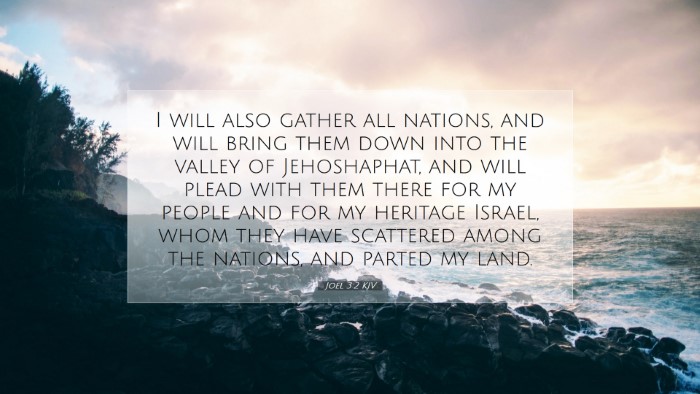Old Testament
Genesis Exodus Leviticus Numbers Deuteronomy Joshua Judges Ruth 1 Samuel 2 Samuel 1 Kings 2 Kings 1 Chronicles 2 Chronicles Ezra Nehemiah Esther Job Psalms Proverbs Ecclesiastes Song of Solomon Isaiah Jeremiah Lamentations Ezekiel Daniel Hosea Joel Amos Obadiah Jonah Micah Nahum Habakkuk Zephaniah Haggai Zechariah MalachiJoel 3:2
Joel 3:2 KJV
I will also gather all nations, and will bring them down into the valley of Jehoshaphat, and will plead with them there for my people and for my heritage Israel, whom they have scattered among the nations, and parted my land.
Joel 3:2 Bible Commentary
Commentary on Joel 3:2
Joel 3:2 states: "I will also gather all nations and bring them down to the Valley of Jehoshaphat; and I will enter into judgment with them there on account of My people, My heritage Israel, whom they have scattered among the nations; they have also divided up My land." This verse serves as a profound prophecy and a call to divine judgment, evoking themes of restoration, justice, and the sovereignty of God over nations.
Context of Joel’s Prophecy
The Book of Joel, among the minor prophets, addresses a time of national crisis for Israel, often interpreted as a response to a locust plague. The prophet Joel, whose name means "Yahweh is God," serves as a voice for God, emphasizing repentance and the impending judgment against Israel’s enemies. This verse indicates a shift in focus from local distress to an eschatological view, where God addresses the nations in judgment.
Theological Insights
- Divine Sovereignty: This passage underscores the belief that God is sovereign over all nations. He actively gathers those who are against His people and prepares to judge them.
- Judgment and Justice: God’s justice is central to this scripture. The “Valley of Jehoshaphat” symbolizes a place of divine judgment. This is where God will confront the nations for their treatment of Israel, His chosen people.
- Restoration of Israel: Joel’s references to Israel as “my heritage” highlight the covenant relationship between God and His people. This suggests assurance of restoration after judgment.
Commentary Insights
Matthew Henry's Perspective
Matthew Henry notes the significance of God gathering all nations, indicating an inclusive divine judgment that transcends geographical and political boundaries. He emphasizes that this gathering is not by chance but orchestrated by God’s providence. The “Valley of Jehoshaphat” is interpreted as a figurative place of judgment rather than a specific geographical location, stressing that God's righteousness will prevail over all injustices committed against His people.
Albert Barnes' Interpretation
Albert Barnes elaborates on the nature of the judgment that God enacts. He suggests that the enemies of Israel are called to account for their actions, particularly for their scattering of God’s people. Barnes emphasizes the tension between divine justice and mercy, where God’s judgment serves not only to reprimand but to restore His heritage. The act of dividing the land among nations is particularly egregious in God’s eyes, reflecting the desecration of what is sacred.
Adam Clarke's Analysis
Adam Clarke approaches this verse with a focus on the prophetic insight twards the future ramifications of God's judgment. Clarke suggests that this prophecy acts both as a warning to the oppressors of Israel and as encouragement for the oppressed. He reinforces the notion that God will vindicate His people by sovereignly resolving the injustices they face, assuring that the land initially meant for Israel will ultimately be reclaimed and restored.
Historical Context
Understanding the historical backdrop of Joel’s message is crucial. Israel had faced numerous invasions and exiles, with significant trauma resulting from foreign powers dominating their lands. The prophecy, therefore, serves not only as a message of warning but also as a promise of restoration. The “Valley of Jehoshaphat” refers to a historical moment of divine intervention during King Jehoshaphat’s reign, where God fought on behalf of Israel. This historical context enriches the thematic elements of judgment and hope woven throughout the text.
Practical Applications for Today
- Assurance in God’s Justice: Believers are reminded that injustices observed today will not go unnoticed by God. This prophecy reassures that divine justice will ultimately prevail.
- Call to Repentance: Just as Joel called for national repentance, modern congregations are invited to examine their own actions and societal injustices, responding with humility and a desire for restoration.
- Hope for the Oppressed: This passage offers comfort to those facing oppression. It reassures them that God sees their suffering and promises a reckoning and restoration.
Conclusion
Joel 3:2 stands as a powerful reminder of God's sovereignty and justice. By uniting insights from historic commentaries, we recognize the timeless relevance of this verse. For pastors, students, theologians, and scholars, understanding the breadth of God’s plan for judgment and restoration encourages a deepened faith and commitment to God’s righteous cause. This prophetic message resonates through centuries, affirming that God oversees the affairs of nations and will defend His people in due time.


